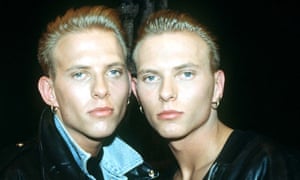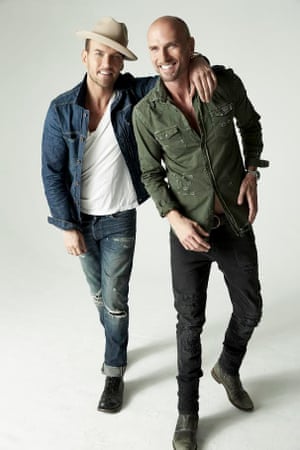My chronology:
Pre-1980: Beatles + Elvis + other crap my parents had
1980 (age 9-10): Bought my first rock albums,
Hi Infidelity by REO Speedwagon,
Crimes of Passion by Pat Benatar, and
The Game by Queen. At the time they were considered pop -- in hindsight, they were guitar-based hard rock. Also bought a 45rpm single of "Refugee" by Tom Petty. Uncle bought me Led Zeppelin's
Coda -- I didn't really like it and set it aside.
1981 (age 10-11): Started liking "corporate" rock acts like Styx (
Paradise Theater), Foreigner (
4), Journey (
Escape), Rick Springfield ("Jessie's Girl"). At some point I remember hearing "For Those About To Rock" on the school bus -- some kid had a tape and the bus driver was cool enough to play it over and over. That was a big step toward hard rock/metal for me. Checked out
Back in Black and
Dirty Deeds too -- somehow
Highway to Hell escaped me at that point. Also recall hearing "Tom Sawyer" by Rush on the radio and thought that was cool. Van Halen too.
1982 (age 11-12): Dusted off my old copy of
Coda and started liking Led Zeppelin. A lot. Joined Columbia Record Club and started building a collection. Zep, Queen, Rush, The Who, Pink Floyd, more Beatles, Stones. Basically this is when I started catching up on some of the "classic" rock and hard rock from the 60s and 70s. Probably bought my copy of
Moving Pictures in this time frame, and likely
Signals as well. Van Halen was starting to get really big. IIRC, Maiden didn't really register with me until...
1983 (age 12-13): A big year. First,
Pyromania by Def Leppard came out and was fucking huge. I wore that tape out. A little album called
Thriller got some noteworthy attention. U2 hit it big too. Metal also started getting very heavy airplay on MTV; I probably first heard Judas Priest and Scorpions in this time frame. Some time after
Piece of Mind came out, a friend made me a tape. I immediately became a Maiden fan. I bought the first four albums, plus
Maiden Japan. Black Sabbath, Ozzy and Dio followed shortly thereafter, as well as more Priest. I officially became a metal fan this year. In addition to bands already mentioned, I remember Motley Crue, Quiet Riot, Ratt, Krokus, and other metal bands blowing up that year.
1984 (age 13-14): Metal/hard rock was extremely popular. Scorpions, Twisted Sister, Priest, Quiet Riot, Whitesnake all had huge albums that year. None bigger than Van Halen's
1984 -- though I hated "Jump," I loved "Hot for Teacher" and "Panama."
Purple Rain was pretty goddamn big that year too. I got to second base for the first time while listening to "When Doves Cry." Still love that song. And, of course, I bought
Powerslave the day it was released. I still own that copy, with the textured cover, and it still sounds great. Shortly before Christmas, I went to my very first rock concert: Iron Maiden in Kansas City, with Twisted Sister opening. World Slavery Tour. Needless to say, that made an impression.
1985-87: I vividly remember Live Aid, which was on my birthday in 1985. Queen stole the show, Led Zeppelin reunited (with Phil Collins on drums), and a lot of other great bands. I watched the whole thing on MTV. Somewhere in 1986 or 1987, I heard Metallica (
Master of Puppets) for the first time -- holy shit.
SiT released; saw that tour too. I started dating and listening to music that wouldn't totally alienate girls. Grew to like The Replacements, REM, U2.
1988:
Appetite for Destruction -- holy shit again. More Metallica.
Seventh Son. Still listening to classic rock and metal from the 70s and early 80s.
1989-1993: Went to college. Started digging The Clash and other punk bands, plus Radiohead, Nirvana and more college/alt-rock bands.
Nevermind was a game-changer, nearly killed metal, except
Metallica was even bigger. I recall U2's
Achtung Baby being a big deal. Was also exposed to Public Enemy, Tribe Called Quest, Big Daddy Kane, and others. In 1992, saw G'n'R/Metallica stadium tour. Did you know Nirvana was almost the opening act on that tour? That would have been quite a bill.
1993-2006: Went to law school, got a job, got married, had kids. Life as a law firm associate didn't leave much time for music, plus I wasn't really into the grunge/hip-hop stuff that was emerging.
2006: Heard that Iron Maiden was releasing a new album. Went back and checked out albums I'd missed -- loved
BNW and parts of
DoD. Bought
AMOLAD on release date, joined this forum, went to first Maiden concert in ~20 years. The last 10 years have been pretty well documented in this forum.
EDIT: My chron is pretty similar to AlexS's, which makes sense as we are the same age.
a K-Tel collection with live "I Want You To Want Me"
I had that too! Plus a K-Tel collection with "I Was Made For Loving You," which was my first exposure to KISS. Perhaps not coincidentally, I've always hated KISS.




